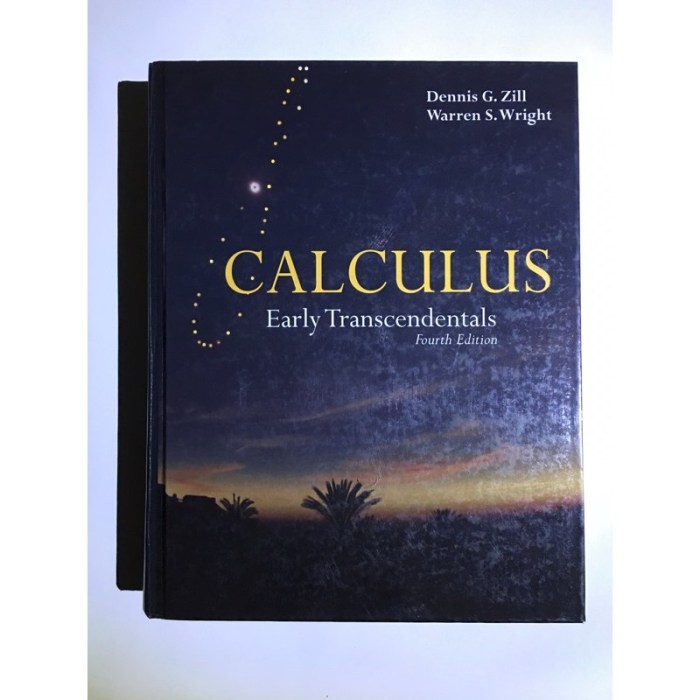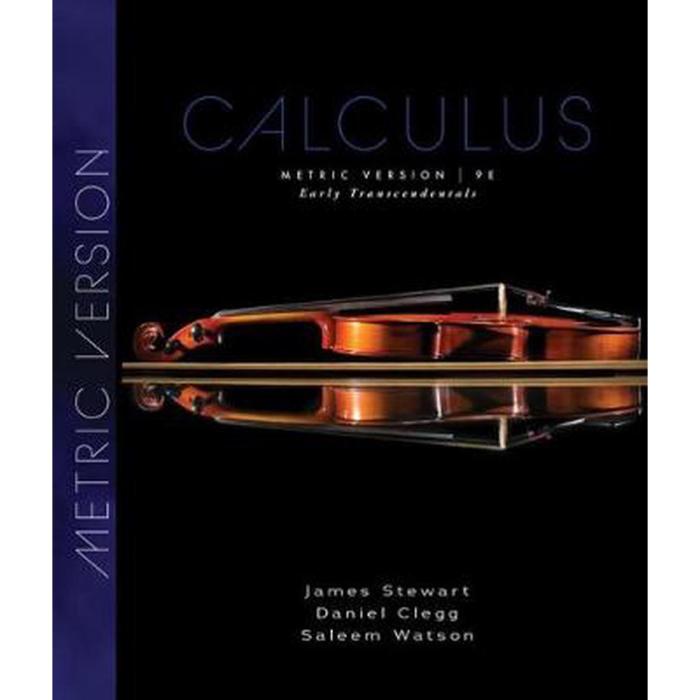Calculus early transcendentals fourth edition – Calculus: Early Transcendentals, Fourth Edition, embarks on a journey through the captivating realm of mathematical concepts, offering a comprehensive and engaging exploration of the subject. This textbook, designed for students seeking a deep understanding of calculus, presents a well-structured and accessible approach to mastering this foundational discipline.
With its clear and concise explanations, meticulously crafted examples, and abundance of practice exercises, Calculus: Early Transcendentals, Fourth Edition, empowers students to develop a strong conceptual foundation in calculus. The authors’ pedagogical expertise shines through, as they adeptly guide readers through complex mathematical concepts, fostering a genuine appreciation for the beauty and power of calculus.
1. Textbook Overview: Calculus Early Transcendentals Fourth Edition

Calculus: Early Transcendentals, Fourth Edition by James Stewart is a comprehensive textbook designed to introduce students to the fundamental concepts of calculus. The book is organized into 16 chapters, each covering a specific topic in calculus. The chapters are further divided into sections, which provide a detailed explanation of the concepts and theorems.
The book also includes numerous examples and exercises to help students practice the concepts they have learned.
Key Features
- Clear and concise explanations of mathematical concepts
- Numerous examples and exercises to help students practice the concepts they have learned
- A variety of pedagogical features to help students learn the material, such as:
- Concept Check questions to help students assess their understanding of the material
- True/False questions to help students identify common misconceptions
- Review questions to help students summarize the material they have learned
- A comprehensive online resource center that provides students with additional resources, such as:
- Interactive simulations
- Video lectures
- Practice exercises
Target Audience and Prerequisites, Calculus early transcendentals fourth edition
Calculus: Early Transcendentals, Fourth Edition is designed for students who have completed a course in precalculus. The book assumes that students have a basic understanding of algebra, trigonometry, and analytic geometry.
2. Chapter Summaries

The following is a detailed summary of each chapter in Calculus: Early Transcendentals, Fourth Edition:
Chapter 1: Functions and Models
- Objectives:To introduce the concept of a function, to learn how to graph functions, and to apply functions to real-world problems.
- Key Concepts:Functions, graphs of functions, domain and range, inverse functions, composite functions, and applications of functions.
- Applications:Modeling population growth, projectile motion, and other real-world phenomena.
Chapter 2: Limits and Continuity
- Objectives:To introduce the concept of a limit, to learn how to evaluate limits, and to apply limits to real-world problems.
- Key Concepts:Limits, continuity, infinite limits, and indeterminate forms.
- Applications:Finding the area under a curve, calculating the velocity of a moving object, and other real-world phenomena.
Chapter 3: Derivatives
- Objectives:To introduce the concept of a derivative, to learn how to find derivatives, and to apply derivatives to real-world problems.
- Key Concepts:Derivatives, the chain rule, product rule, quotient rule, and applications of derivatives.
- Applications:Finding the slope of a curve, calculating the rate of change of a function, and other real-world phenomena.
Chapter 4: Applications of Derivatives
- Objectives:To learn how to use derivatives to solve real-world problems.
- Key Concepts:Maxima and minima, concavity, points of inflection, and optimization.
- Applications:Finding the maximum and minimum values of a function, finding the points of inflection of a function, and optimizing a function.
Answers to Common Questions
What are the key features of Calculus: Early Transcendentals, Fourth Edition?
Calculus: Early Transcendentals, Fourth Edition, offers a range of features designed to enhance the learning experience, including interactive exercises, real-world applications, and a wealth of practice problems.
Is Calculus: Early Transcendentals, Fourth Edition, suitable for students with different learning styles?
Yes, Calculus: Early Transcendentals, Fourth Edition, employs a pedagogical approach that caters to diverse learning styles. The use of visual aids, step-by-step explanations, and a variety of examples ensures that students can grasp concepts effectively.
How does Calculus: Early Transcendentals, Fourth Edition, compare to other calculus textbooks?
Calculus: Early Transcendentals, Fourth Edition, stands out with its comprehensive coverage, clear and engaging writing style, and abundance of practice exercises. It offers a well-rounded approach that prepares students for success in calculus and beyond.
